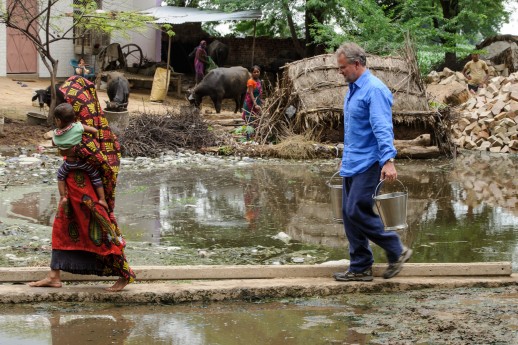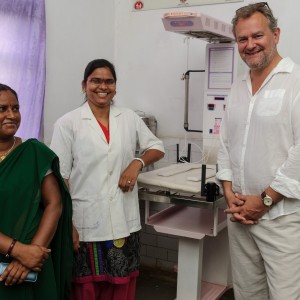An article Hugh wrote for WaterAid about his trip to India
Childbirth and the intense kaleidoscope of emotions that accompany it is something so many of us have shared. Whether at hospital or at home, we’re usually surrounded by the support, comfort and amenities that help bring a new life safely into the world. Be it pain relief, water on tap, hygienic conditions or the good sanitation that every mother and baby needs. We hear that first squeal and then let joy be unconfined… well, I squealed when I first saw my son, anyway.
But for millions of families around the world, the experience can be very, very different. In many countries, unsafe water, poor sanitation, and a lack of good hygiene pose a grave risk to life during childbirth.
This winter, WaterAid is helping change this through its Deliver Life appeal, which aims to reach more than 130,000 mothers and their families around the world with safe water. Every pound donated over the next three months will be doubled by the UK Government, helping to reach twice as many people with clean water and proper toilets.
No expectant mother should have to walk long distances to collect dirty water and worry that the place in which she will give birth has no clean water or toilet facilities. Fathers-to-be shouldn’t have to worry that their baby is at risk from deadly infection because of unhygienic conditions. Midwives shouldn’t have to deliver babies when they have no water available to keep their hands and medical equipment clean.
In this day and age, having access to clean water and decent toilets should not be something that other people have. Coupled with good hygiene, these essentials are lifesavers and should be available to all. During a recent visit to India with WaterAid, I realised how much I take these basic resources for granted.
I visited Narai Ka Pura, a rural village in Madhya Pradesh, where the health and prospects of the community are compromised every day by a lack of clean water and toilet facilities. There is only one hand-pump in the village, shared between 300 people. It lies low in the ground, alongside livestock and their manure, partly submerged in the mosquito-ridden, muddy, stagnant pools of water that are the result of insufficient drainage. Tests confirm that the water is also contaminated with harmful human waste.
There by the water-pump I met Reena and Anil, a couple with four young children. Reena had just returned from the hospital with their 8-month-old baby who had been suffering from a bad case of diarrhoea, probably as a result of drinking the dirty water and poor sanitation – the community’s toilet is the field where they grow the crops on which they depend for food. Diarrhoea is the second leading disease cause of deaths in children under five across South Asia. Like many others in this village, Reena’s older children suffer from skin diseases, caused by the unsanitary conditions. They make regular visits to the hospital, spending much of their income on medical bills.
As a father, it was hard for me to hear Reena explain how helpless she feels in terms of her children’s wellbeing: she has no option but to give them unsafe water from the pump, even though it makes them sick. Her family is trapped in a cycle of ill health and poverty.
I then visited Mahadev Pura, a nearby village where WaterAid has worked in the past. Here the provision of safe water and proper toilet facilities makes this community seem a world away from its neighbour. The streets were clean and well-constructed, with proper drainage. The water sources were safe and protected, the toilets, one in every home, were proudly looked after, and the children were healthy.
Clean water, good sanitation and good hygiene are vital for healthy, dignified lives, and one of the most important times is during childbirth and the first 28 days of life. I met midwives in the local health centre, who spoke about how crucial these basic resources are in ensuring that babies are given the best chance of survival.
As well as maintaining the cleanliness in the local environment and providing safe water to mothers and their children, the health centre helps spread awareness of the importance of keeping babies free from infection through safe water and good sanitation and hygiene practices.
The medical facilities in this village were installed eight years ago, but many hospitals across developing countries still lack these basic amenities, which can have devastating consequences for expectant mothers.
One in five newborn baby deaths are due to infection caused by dirty water and an unclean environment, while sepsis accounts for 11% of maternal deaths around the world. These deaths are completely preventable, and we can help prevent them by improving access to safe water and good hygiene.
Every £1 donated to WaterAid’s Deliver Life appeal between 10th November and 10th February will be doubled by the UK Government. Find out more at deliverlife.wateraid.org.










